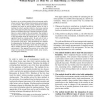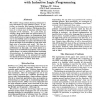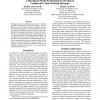86
Voted
AAAI
1994
15 years 2 months ago
1994
An approach to nonmonotonic inference, based on preference orderings between possible worlds or states of affairs, is presented. We begin with an extant weak theory of default con...
47
Voted
AAAI
1994
15 years 2 months ago
1994
113
click to vote
AAAI
1996
15 years 2 months ago
1996
While the explosion of on-line information has brought new opportunities for nding and using electronic data, it has also brought to the forefront the problem of isolating useful ...
114
click to vote
AAAI
1994
15 years 2 months ago
1994
New approaches to solving constraint satisfaction problems using iterative improvement techniques have been found to be successful on certain, very large problems such as the mill...
114
click to vote
AAAI
1996
15 years 2 months ago
1996
In order to re-use existing models of the environment mobile robots must be able to estimate their position and orientation in such models. Most of the existing methods for positi...
61
Voted
AAAI
1993
15 years 2 months ago
1993
Recently several local hill-climbing procedures for propositional satisability have been proposed, which are able to solve large and di cult problems beyond the reach of conventio...
98
Voted
AAAI
1994
15 years 2 months ago
1994
We consider using machine learning techniques to help understand a large software system. In particular, we describe how learning techniques can be used to reconstruct abstract Da...
93
Voted
AAAI
1993
15 years 2 months ago
1993
A novel approach to integrating case-based reasoning with model-based diagnosis is presented. The main idea is to use the model of the device and the results of diagnostic tests t...
102
Voted
AAAI
1994
15 years 2 months ago
1994
This paper presents a plan-based architecture for response generation in collaborative consultation dialogues, with emphasis on cases in which the system (consultant) and user (ex...
109
click to vote
AAAI
1996
15 years 2 months ago
1996
We present a method for specifying temporal constraints on trajectories of dynamical systems and enforcing them during qualitative simulation. This capability can be used to focus...



